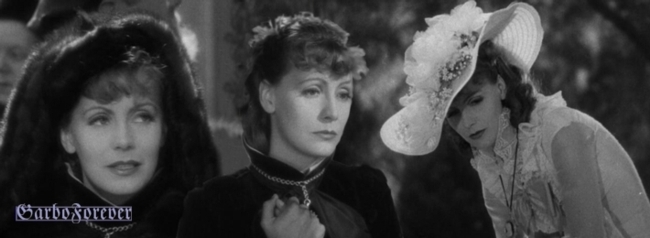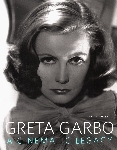 ANNA KARENINA |
||
(USA 1935)
|
||
| FILM SCENES | ||
|
|
||
| COMPANY | ||
Metro-Goldwyn-Mayer (MGM)
|
||
| CREDITS | ||
Directed by Clarence Brown.
|
||
| TECHNICAL SPECS | ||
95 Minutes
|
||
| CAST | ||
Greta Garbo, Fredric March, Freddie Bartholomew, Maureen O'Sullivan, May Robson, Basil Rathbone, Reginald Owen, Reginald Denny, Phoebe Foster, Constance Collier, Gyles Isham, Buster Phelps, Ella Ethridge, Joan Marsh, Sidney Bracey, Cora Sue Collins, Olaf Hytten, Joe E. Tozer, Guy D. Ennery, Harry Allen, Mary Forbes.
|
||
| GARBO'S CHARACTER | ||
Anna Karenina
|
||
| FILM POSTER | ||
|
||
| SYNOPSIS | ||
The setting is nineteenth-century Russia. Anna Karenina (Greta Garbo) is married to a wealthy government man, Karenin (Basil Rathbone), and has a young son, Sergei (Freddie Bartholomew). She goes to visit her brother, Stiva (Reginald Owen), to save his marriage from ruin due to other women in his life. She meets Count Vronsky (Fredric March) and they fall in love. When she returns home, she continues to see him. She asks her husband for a divorce, but he refuses and tells her that if she becomes Vronsky's mistress, she will forfeit all claim to their son. Desperately in love, Anna goes with Vronsky anyway. He leaves the army and at first their life together is idyllic. Soon he begin to yearn for the military life and, after an argument with Anna, joins the army again. When Anna goes to the train-station to see him and make up with him, she sees his mother (May Robson) introducing him to a girl. Anna realizes she has lost everything important to her and throws herself in the path of a train.
|
||
| QUOTES FROM THE FILM | ||
| (in Treatment)
|
||
| AUDIO-FILE | ||
|
||
| SOUNDTRACK | ||
| There is a double LP of Stothart soundtracks, issued circa 1980 but long deleted. It includes a lengthy suite from Anna Karenina, plus David Copperfield, Mutiny on the Bounty and other scores. Taken from acetates in the Stothart estate.
|
||
| MOVIE PROGRAM | ||
|
||
| MOVIE ADVERTISMENTS | ||
|
||
| PREMIERED/RELEASED | ||
Release Date in USA: August 30,1935
|
||
| LOBBYCARDS | ||
|
||
| PRODUCTION | ||
| Production dates: March–May 1935
|
||
| MOVIE STILLS | ||
| The Stills were made during the production by William Grimes . 108 Movie Stills were shot.
|
||
| TRIVIA | ||
|
||
| BACKGROUND STORY | ||
| (in Treatment)
|
||
| BUSINESS DATA | ||
| Budget:1.152.000 Dollar.
|
||
| PORTRAITS | ||
Clarence Sinclair Bull made the portraits of Garbo for the film on May 17, 1935.
|
||
| REVIEWS | ||
William Boehnel for New York World-Telegram: |
||
There is always an excitement and interest about any role that Greta Garbo portrays on the screen, and so, even though Anna Karenina can hardly be called one of the best films she has ever made, it is as exciting as any because of the marvelously restrained performance she gives in the title role. There is nothing dull or dreary about Garbo, who succeeds, for the greater part, in recreating a believable Anna.
|
||
| Eileen Creelman for New York Sun: | ||
Greta Garbo, after several years of miscasting, is back at last in her own particular province of glamour and heartbreak, of tragic lovely ladies and handsome ruthless men. She has even discarded those extraordinary costumes which have made her look like a theatrical dressmaker's advertisement, and, happily aided by excellent photography and becoming gowns, reclaimed her own unique beauty.... Clarence Brown may be responsible for the Swedish star's return to enchantment. It was he who directed her in Romance, in Flesh and the Devil, Anna Christie, and other of her better screen plays. After four years professionally apart, years in which Miss Garbo wandered through such dreary films as the clammy Queen Christina, the director-star team is reunited. For Miss Garbo's sake it may be hoped this combination will last.... Garbo's haunting beauty is what you will remember of Anna Karenina. |
||
| Photoplay: | ||
| This is a weak and dull picture, yet the persuasive genius of Garbo raises it into the class of art. What should be moving seems dated, though the production is magnificent and Garbo, exquisitely photographed, has more fire than in her last several pictures. |
||
| Nobert Lusk for Picture Play: | ||
| Garbo's greatness as supreme star of the screen is here exhibited for all who have eyes to see, ears to hear, and imagination to be stirred. And, as always, the play is made to seem less important than the talent. Meticulous costumes and settings complete a marvelous reproduction of St. Petersburg society in the ‘70's. But dignified acting doesn't altogether disguise the Russian East Lynne.
|
||
| SIMILAR FILMS | ||
| Anna Karenina – with Vivien Leigh (UK 1948)
|
||
| FAN ART | ||
|
||
| PICTURE FROM THE FILM-SET | ||
Director Cukor and Garbo
|
||
| STORY FROM THE FILM-SET | ||
Greta was informed of Fredric Marchs reputation as a womanizer, Greta reportedly chewed on garlic prior to their love scenes as a deterrent against unwanted advances. The actor admitted that he never really got to know Garbo well. He misunderstood her preference for addressing him as “Mister March.” Even when making small talk about March's trip to Tahiti, the distance was there. “She was always so afraid, shy, everything bothered her,” he said. After observing her in a particularly poignant scene, the actor offered his congratulations. “She looked at me. ‘You were looking, Mr. March?' ‘Yes, Miss Garbo.' ‘Really, you were looking at me, Mr. March?' ‘But yes, Miss Garbo.' ‘Please you should not look at me, Mr. March. It is embarrassing.' She had many complexes, poor dear.”
|
||
| SOUNDTRACK | ||
| There is a double LP of Stothart soundtracks, issued circa 1980 but long deleted. It includes a lengthy suite from Anna Karenina, plus David Copperfield, Mutiny on the Bounty and other scores. Taken from acetates in the Stothart estate.
|
||
| THE ORIGINAL NOVEL | ||
| Based on the novel Anna Karenina by Count Leo Tolstoy .
|
||
| THE SCREEN-PLAY | ||
|
|
||
| DVD/VHS | ||
Available on DVD & VHS.
|
||
SOURCE |
||
Greta Garbo: A Cinematic Legacy – by Mark A. Vieira (Harry N. Abrams, Incorporated, New York 2005). This is the best and most accurate book about Garbo's-Films.  |
||
OTHER SOURCES |
||
Karen Swenson – A life Apart Barry Paris – Garbo IMDB – International Movie Database plus many other books, magazines and internet sites. |
||
| Film - Introduction |
© Copyright 2005 – www.GarboForever.com – Germany – TJ & John – The Webmasters